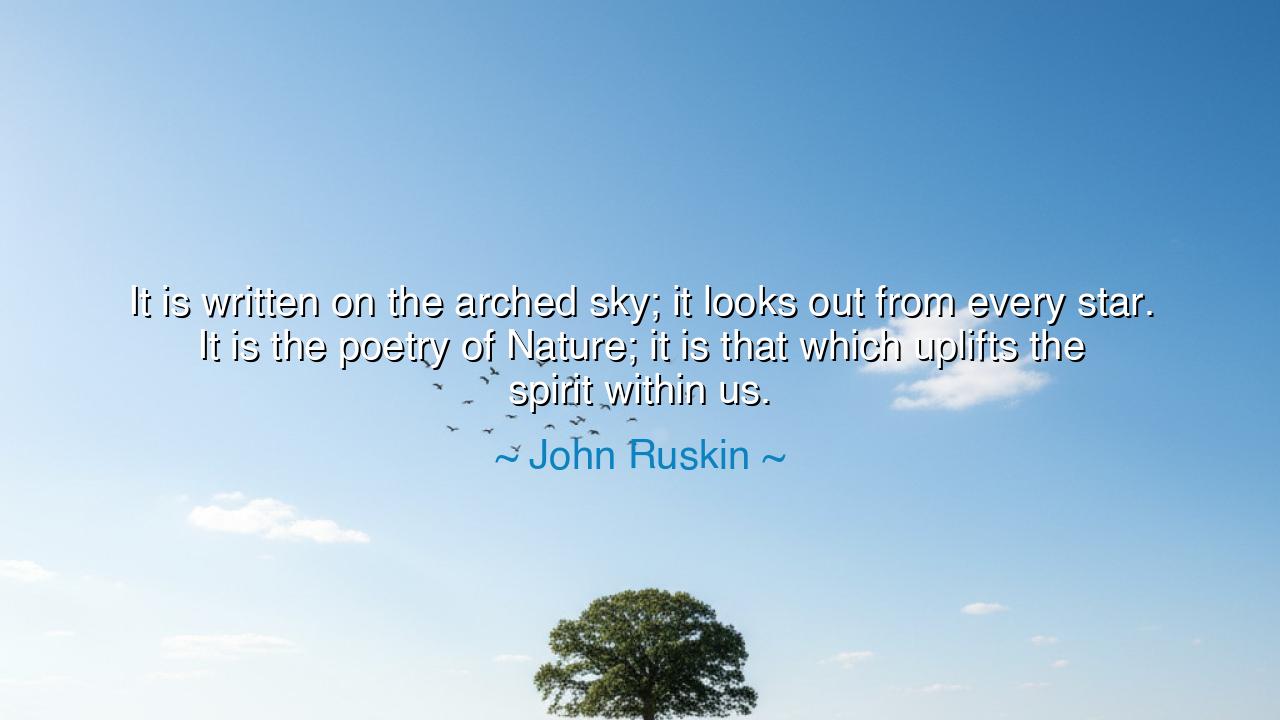
It is written on the arched sky; it looks out from every star.
It is written on the arched sky; it looks out from every star. It is the poetry of Nature; it is that which uplifts the spirit within us.






John Ruskin once declared: “It is written on the arched sky; it looks out from every star. It is the poetry of Nature; it is that which uplifts the spirit within us.” These words resound like a hymn of reverence for creation. Ruskin, that great critic, painter, and prophet of beauty, here speaks of something eternal: that the truths of life and the presence of the divine are not confined to books or temples, but are revealed in the vast heavens and in the quiet majesty of the stars. The poetry of Nature is not written in ink but in light, not bound to parchment but inscribed upon the living universe itself.
The origin of this saying lies in Ruskin’s philosophy of art and nature. He lived in an age of industry and mechanization, when smoke began to darken the skies and human hands threatened to sever their bond with creation. Against this, Ruskin raised his voice to remind men that beauty and truth still surrounded them, if only they would look. To him, the sky was not empty space, but an arched cathedral; the stars were not cold fires, but living symbols of order, mystery, and eternal poetry. To contemplate them was to feel the spirit lifted above the petty concerns of earth.
The ancients knew this truth well. The Babylonians read the stars and saw the handwriting of destiny. The Greeks saw in the constellations the stories of gods and heroes, inscribed forever on the heavens. The Hebrew psalmist sang, “The heavens declare the glory of God, the firmament showeth His handiwork.” Ruskin’s words stand in this same lineage, proclaiming that the poetry of Nature is older than human song, and that it whispers eternally from the night sky to every soul that will listen.
History gives us vivid examples of this uplifting power. Consider Galileo, who first turned his telescope to the stars. Though condemned by men, he declared with awe the vastness of creation. Or think of Harriet Tubman, who, in the dark nights of her journeys, followed the North Star as her guide to freedom. For her, the sky was not only beauty but salvation, a living map of hope. In both cases, the stars were not silent—they spoke, they guided, they inspired. Truly, this is the poetry of Nature Ruskin describes, which awakens courage and faith in those who heed it.
The meaning of Ruskin’s words is that beauty is not trivial—it is essential. The poetry of Nature is the hidden language that connects the human soul to the infinite. When the spirit feels weary, when life feels small or broken, to lift the eyes to the sky is to be reminded that we are part of something vast, eternal, and radiant. The stars do not ask us to own them; they ask us to wonder, and in that wonder lies renewal.
The lesson for us is clear: do not walk through life with your eyes fixed only on the ground. Look upward. Look outward. Let the sky and the stars remind you of what words cannot fully capture. Do not think that poetry lives only in books, for the greatest verses are written across the heavens and in the wind through the trees. When you feel crushed by the weight of days, go to the mountains, walk beneath the night sky, and allow your spirit to be lifted by what Ruskin saw—the eternal poetry of creation.
In practice, this means cultivating stillness and wonder. Take time each day to observe, not merely to consume. Watch the sunrise, listen to the wind, study the stars. Let these be your teachers as much as any man or book. And when you see beauty, do not pass it by as ornament; receive it as nourishment for your soul. For it is written, as Ruskin said, on the very arched sky itself: the eternal reminder that the poetry of Nature is always speaking, and always ready to uplift the spirit of those who listen.
Therefore, remember Ruskin’s wisdom: “It is written on the arched sky; it looks out from every star. It is the poetry of Nature; it is that which uplifts the spirit within us.” Let this truth be a lantern in your life. Seek beauty not as escape, but as strength. Let the stars remind you of eternity, let the sky humble you into awe, and let the poetry of Nature restore in you the courage to live nobly and fully, in harmony with the creation that surrounds you.






AAdministratorAdministrator
Welcome, honored guests. Please leave a comment, we will respond soon